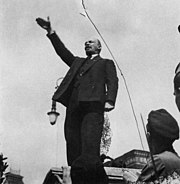Oktyabr (1927)[aka Ten Days That Shook the World] [Silent, with Music by Shostokovich] 104 mins
Dir. Grigori Aleksandrov/Sergei M. Eisenstein-early Soviet film about the Russian Revolution.
The Age of Dictatorship: Europe 1918-1989 - Stalin and his imitators
Overview
The most durable dictators in twentieth-century Europe were Communists dictators. The final lecture in the series shows how Stalin established the pattern of Communist dictatorship, and asks how far the 'cult of personality' survived the process of 'destalinization' that followed his death in 1953.
Decolonization: The End of Empire?
Overview
European empires, re-divided after the defeat of Germany in 1918, continued to expand after the First World War, reaching their greatest extent in the early 1940s. The imperial ambitions of Fascist Italy and Nazi Germany created new empires that turned out to be very short-lived. With the emergence of the Cold War came a bipolar world dominated by two anti-colonial powers, the USA and USSR. Nationalism in the colonies grew apace, spurred by the loss of imperial legitimacy through the genocidal rule of Nazi Germany in Eastern Europe. Other European powers now began to feel that empire was unjustifiable following an immensely costly war that ended with human rights being enshrined in the United Nations Charter. Japanese rule over many European colonies in the Pacific severed ties with the imperial power and destroyed the legitimacy of empire. Once one major colony, such as India, gained independence, the momentum for others to follow became unstoppable. The lecture concludes by examining the legacy of empire in a post-colonial world. Have we escaped its influence or is it still with us?
This is a part of the lecture series The Rise and Fall of European Empires from the 16th to the 20th Century.


No comments:
Post a Comment